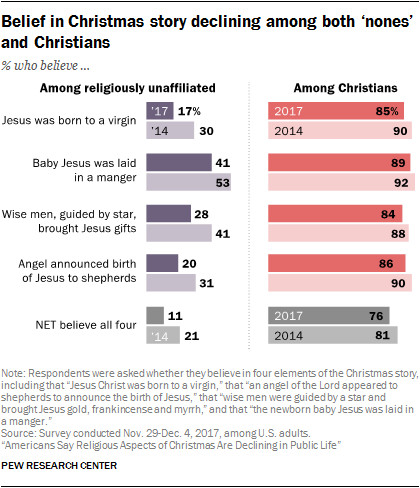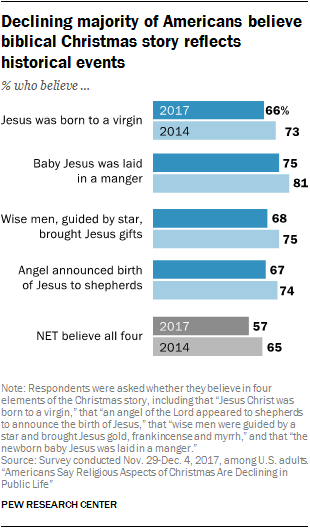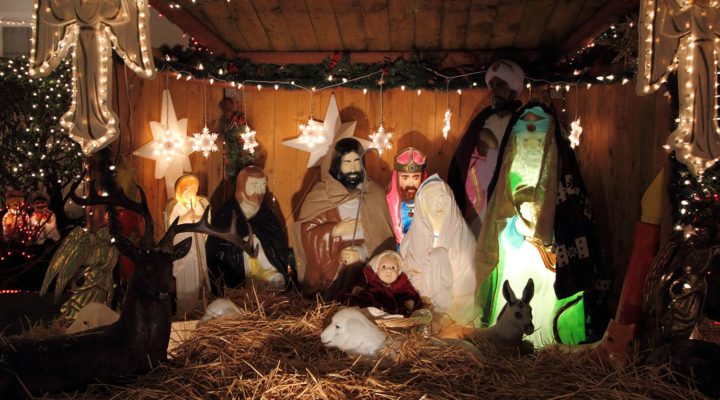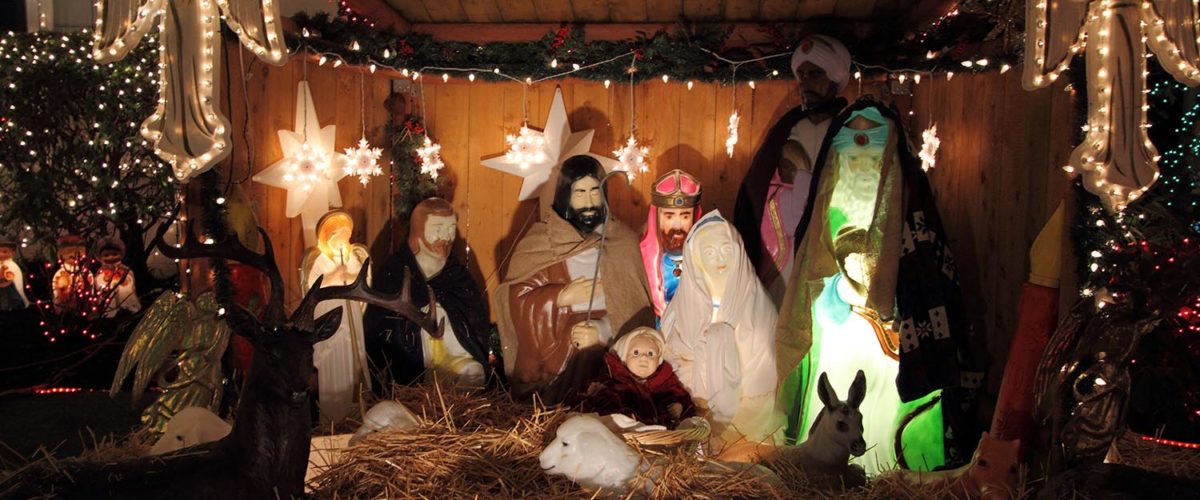Many Church of Christ members have historically drawn a sharp distinction between Christmas and the birth of Christ, usually dismissing the former as a commercial, even pagan, observance.
Nowhere in the New Testament, preachers and Sunday school teachers have counseled, is the word “Christmas” to be found.
“Mistletoe was welcome, but mangers certainly were not, in a fellowship that marked Dec. 25 as a secular holiday but purposely never sang ‘Joy to the World,’ after about mid-November,” The Christian Chronicle, an international Church of Christ newspaper, explained in 2005.
Well, it seems the culture is catching up with that approach to the holiday, according to a new study.
 Fewer Americans today believe the biblical accounts of Jesus’ birth are reflected in the way the culture observes the season, the Pew Research Center said.
Fewer Americans today believe the biblical accounts of Jesus’ birth are reflected in the way the culture observes the season, the Pew Research Center said.
“As long-simmering debates continue over how American society should commemorate the Christmas holiday,” Pew continued, “most U.S. adults believe the religious aspects of Christmas are emphasized less now than in the past — even as relatively few Americans are bothered by this trend.”
Pew also found a shrinking majority supports religious displays on public property while an increasing number are unconcerned whether they are greeted with “Merry Christmas” or “Happy Holidays” during the season.
Religious observances of Christmas also seem to be diminishing in the private lives and beliefs of Americans, Pew said in its Dec. 12 study titled “Americans Say Religious Aspects of Christmas Are Declining in Public Life.”
“ For instance, there has been a noticeable decline in the percentage of U.S. adults who say they believe that biblical elements of the Christmas story — that Jesus was born to a virgin, for example — reflect historical events that actually occurred.”
For instance, there has been a noticeable decline in the percentage of U.S. adults who say they believe that biblical elements of the Christmas story — that Jesus was born to a virgin, for example — reflect historical events that actually occurred.”
Among American adults, 55 percent report observing Christmas as a religious holiday. It was 59 percent who said so in 2013, Pew said.
The statistics seem to be in keeping with numerous surveys documenting the decline of religious adherence in the United States.
“America remains a largely Christian nation, although less so than in the past,” Gallup said in a December 2016 study.
That survey found nearly eight in 10 Americans identified with a religion, usually Christianity, while 21 percent reported having no religious affiliation, which was up from 15 percent in 2008.
“The most significant trend in Americans’ religiosity in recent decades has been the growing shift away from formal or official religion,” Gallup said.
“Americans are also significantly less likely now than they were in the past to claim membership in a church, synagogue or mosque.”
Americans also say they believe faith overall is diminishing in the U.S.
“Americans continue to perceive that religion is less influential than it used to be, with 72 percent in 2016 saying that religion is losing its influence on American life.”
But the rise of the religiously unaffiliated, also known as “nones,” does not fully explain the decline of Christmas as a religious holiday in the U.S., Pew said.
“Nones” certainly are less likely to believe in the Bible’s presentation of Jesus’ birth, but they aren’t the only ones, Pew said.
“At the same time, the new study finds a small but significant decline in the share of Christians who believe in the Christmas narrative contained in the Bible,” the organization said.
The percentage of Christians who believe in Jesus’ virgin birth, the coming of the Magi, the angel’s announcement and the manger scene has dropped from 81 percent in 2014 to 76 percent today.
“This decline has been particularly pronounced among white mainline Protestants.”
Even so, Christmas has some life left in it.
The share of Americans who observe the holiday in some fashion has changed little in recent years, Pew reported.
“Nine-in-10 U.S. adults say they celebrate the holiday, which is nearly identical to the share who said this in 2013,” Pew said. “About eight-in-10 will gather with family and friends. And half say they plan to attend church on Christmas Eve or Christmas Day.”


